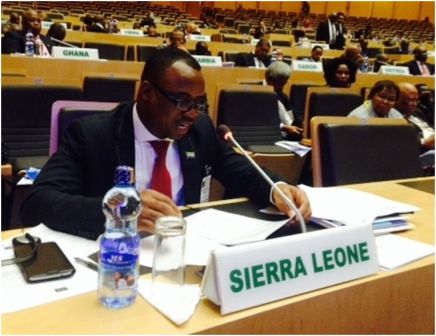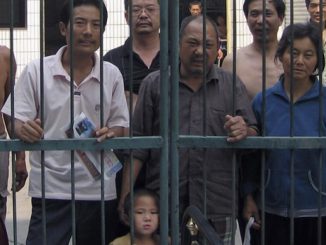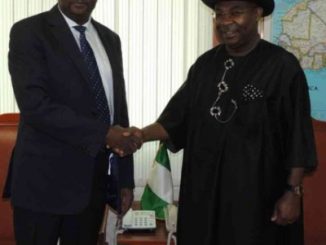
Ambassador Osman Keh Kamara addresses African Union Open Session on Women, Peace and Security

Yesterday, the African Union ( AU ) organized an Open Session of the African Union Peace and Security Council on the commemoration of the 15th Anniversary of the United Nations Security Council Resolution 1325 on Women, Peace and Security.
The Session was attended by ambassadors of the AU, the U.S. Ambassador to Ethiopia, diplomatic representatives of the European Union ( EU ), member states , development partners and representatives of specialized groups.
Sierra Leone’s Ambassador to Ethiopia and the AU, His Excellency Mr. Osman Keh Kamara , delivered a statement at the Session . READ THE STATEMENT BELOW :
STATEMENT BY AMBASSADOR OSMAN KEH KAMARA AT THE OPEN SESSION OF THE AFRICAN UNION PEACE AND SECURITY COUNCIL ON THE COMMEMORATION OF THE 15TH ANNIVERSARY OF THE UNITED NATIONS SECURITY COUNCIL RESOLUTION 1325 ON WOMEN, PEACE AND SECURITY.
Addis Ababa 05 November, 2015
Mr. Chairman,
My delegation congratulates the Republic of Chad for assuming the Chairmanship of the African Union Peace and Security Council (PSC) for the Month of November and for the initiative to include this important item on the program of work of the Council. We join others in thanking the PSC for convening this Open session on Women, Peace and Security. The Republic of Sierra Leone welcomes the constructive statements delivered by the African Union Commissioner for Peace and Security, the Special Representative of the United Nations Secretary-General to the African Union, Member States and development partners on this important subject. We all share a fundamental responsibility to always take stock of progress that has been made in improving the conditions of women and reaffirm our commitments to overcome considerable challenges that remain in the full implementation of the Women, Peace and Security agenda.
Mr. Chairman,
It has been reasonably asserted that inequality, poverty and underdevelopment are prevalent in societies where abysmal treatment is meted-out to women, girls and children. Tension, chaos, conflicts and anarchy are commonly associated with these societies. The prevailing violent conflicts in some parts of Africa and the Middle East where the rise of extremism has led to increase and targeted violence against women and girls are classic cases in point. The negative impacts of these conflicts on women, girls and children cannot be over-emphasized. Over fifty percent of current global migrant population, refugees and asylum seekers are women, girls and children from conflict harden societies. The global community needs to adopt a unified solution to address these phenomena for the attainment of our shared goal of international peace and security.
The landmark adoption of the United Nations Security Council Resolution 1325 in the year 2000 manifestly evinced the global community’s recognition of the differential burden that women and girls bear during conflict situations as well as the vital role that women play in conflict prevention, mitigation and resolution. We need to strengthen the meaningful participation of and leadership opportunities for women in tackling the root causes and impacts of conflicts and other crises. Within global, continental and regional organizations, we need to encourage more gender-sensitive conflict analysis so that we can best understand the progress that has been made, but also the challenges that remain in implementation.
Mr. Chairman,
Of course, my delegation recognizes the significant progress made so far in the Women, Peace and Security agenda since the adoption of United Nations Security Council Resolution 1325. The number of women in the higher echelons of global, continental, regional and national institutions has increased exponentially in recent years. We commend the African Union Commission for the appointment of an AU Envoy on Women, Peace and Security, the recent appointment of a woman as the new Secretary-General of the African Union Commission as well as the integration of women in various spheres of the Union and regional organizations.
Notwithstanding the progress there is need for consistent attention to the protection pillar of the Women, Peace and Security Agenda. We need to encourage participation of women in various mechanisms of peaceful settlement of disputes as well as in peacekeeping missions with specific gender-sensitive mandates. In post-conflict peace-building we need to focus on women’s economic empowerment. Women’s economic empowerment generates long-term social dividends. Evidence shows that women tend to reinvest over eighty percent of their income back into their families. The economic security of women in post-conflict situations is therefore fundamental to ensuring lasting peace and stability.
My delegation appreciates the numerous political statements made by Member States on sexual violence perpetrated against women and girls in conflict situations; however, these statements must be translated into concrete actions, including accountability, reparation and assistance to the victims of this dehumanizing scourge.
To conclude Mr. Chairman, Women, Peace and Security remains a global agenda. Significant progress has been attained through concerted efforts of the United Nations and its specialized agencies; continental and regional organizations as well as national governments and civil society organizations. Despite this progress, women still encounter myriads of targeted violations. My delegation implores the PSC to adopt a Decision calling on Member States to domesticate the Resolution, craft action plans, establish effective monitoring and evaluation mechanisms and to provide periodic reviews to regional organizations on the implementation of the Resolution. It is my sincere hope that our collective resolve in this session will be translated into concrete actions for the continued improvements of the status of women.
Thank you for your attention.



